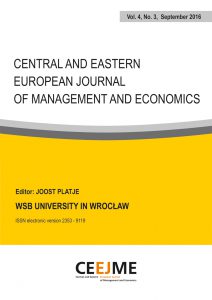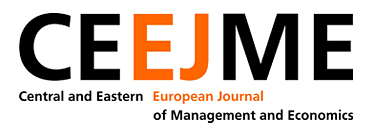
CENTRAL AND EASTERN EUROPEAN JOURNAL OF MANAGEMENT AND ECONOMICS
Vol. 4, No. 3, September 2016, WSB UNIVERSITY IN WROCŁAW
Editor: Joost Platje
Contents: PDF download >>
Cover: PDF download >>
Vol. 4, No.3, 179-188, Sept. 2016
Students’ Awareness of Chemical Risk on a Mexican Campus: The University of Sonora case study
Authors: Nora MUNGUIA, Clara Rosalia ALVAREZ
University of Sonora, Hermosillo, Mexico and University of Massachusetts Lowell, USA
Karla PEREZ, Javier ESQUER, Luis VELAZQUEZ
University of Sonora, Hermosillo, Mexico
Article: PDF download >>
Abstract: Education for Sustainable Development (ESD) is a powerful mean to promotes sustainable development. A decade ago, the UN Decade of Education for Sustainable Development (DESD) promoted this concept to support the creation of a more sustainable future. In 2015, the United Nations launched The Global Action Programme (GAP) to promote the EDS at all levels and in all settings. The University of Sonora in Northwestern Mexico has been engaged in greening its campus by a Sustainability Management System (SMS), which is based on the ISO 14001 international standard. This article is aimed at measuring the awareness of students about safety in chemistry laboratories at the University of Sonora. Despite of being the first university to be ISO 14001 certified in Latin America, findings in this study show that most of the students at the University of Sonora are unaware of key topics of the institutional sustainability management system. Particularly, students are unaware of internal practices for increasing safety in laboratories. A better awareness of the environmental policy and benefits of safety issues among students could be a positive indicator of the relevance of the SMS for increasing the safety within laboratories.
Keywords: sustainability, awareness, perception, ISO 14001, students
JEL: I23, Q01
Vol. 4, No.3, 189-209, Sept. 2016
Governance of Tanzanian Pension Fund Investment
Authors: Wim WESTERMAN, University of Groningen, The Netherlands
Zubeda CHANDE MPINGA, Institute of Finance Management, Dar es Salaam, Tanzania and University of Groningen, The Netherlands
Article: PDF download >>
Abstract: This study aims to examine how mainland Tanzania pension fund investments are governed and which developments can be foreseen. The literature provides ample leads for a conceptual and practical framework on pension fund investment governance. This framework is filled in along a case research design drawing upon system participant interviews. It is shown that whilst the system is gaining strength, its inherent limitations may call for change measures. The pension fund’s investments work out fine and contributors receive value for money. Also, the oversight is thought to work reasonably well. Quirks include investments limitations set by the markets and the government, and also a still low coverage, the heavy weight of the government, a load of administrative costs, employer compliance, beneficiary withdrawal, insufficient education throughout and ignorance in general. The system is governed by complex but strict controls and is being professionalised. To lower administrative costs and raise investment returns, the role of the Ministries versus the Regulator may be amended, while keeping Central Bank in the loop. The paper demonstrates that the hierarchical system engenders agency conflicts that are curbed by a trust grounded common strive for optimal financial value. In specific the paper argues that the investment governance benefits from strict controls and professionalising, especially if financial markets and government limitations are lessened.
Keywords: Tanzania, pension funds, investments, governance
JEL: JEL: G11, G23, G28
Vol. 4, No.3, September 2016
Developing Human and Social Capital through the Provision of Non-formal Education in Western Uganda: A pilot study
Authors: Amy BIRUNGI, Charles KIVUNJA, Neil TAYLOR
University of New England, Armidale, Australia
Article: PDF download >>
Abstract: Since the middle of the last century, non-formal education (NFE) has been promoted as a complement to or substitute for formal education. Today it has come to define myriad programs that sometimes bear little resemblance to one another. This paper argues for the legitimacy of NFE neither as a complement nor a substitute but as an alternative to formal education. From the findings of a pilot study into four programs in western Uganda, NFE is presented as a viable alternative to formal education for its ability to develop social capital, necessary for building self-reliance in learners.
Keywords: Uganda, non-formal education, social capital, human capital, World Bank
JEL: I25, J24
Vol. 4, No.3, 227-238, Sept. 2016
Growth Strategies for Higher Education Business Faculties Faced by Declining Primary Markets
Author: John STEPAN
AGH University of Science and Technology, Krakow, Poland
Article: PDF download >>
Abstract: This paper discusses development strategies for Business Faculties faced by reduced demand from their primary markets (being a decline in their student intake). It starts by discussing possible strategies for Higher Education (H.E.) institutes, goes on to present a “value based” strategy, then continues with a discussion of potential target markets to which Business Faculties could provide significant “Added Value”. It concludes with discussion of the ways in which the H.E. Business Faculty initiatives presented in this paper could complement and reinforce the traditional and historical roles of H.E. Business Faculties
Keywords: Higher education, reduced student intake, development strategies, small & medium sized enterprises (SME’s)
JEL: I23
Vol. 4, No.3, 239-251, Sept. 2016
Values Created by Circular Solutions in the Buildings Sector for Companies and Municipalities as Key Actors
Author: Monika PARADOWSKA
Chair of Economic Geography and Spatial Economics, Faculty of Economics, University of Opole, Poland
Article: PDF download >>
Abstract: A circular economy is considered a tool aimed at eliminating or reducing waste and emissions, leading to improved energy- and resource-efficiency of people’s activity in the socio-economic life. However, introducing circular solutions in the buildings sector requires a new approach, what can be perceived as difficult, not convenient or too complicated, as “traditional” solutions seem to be easier. The main aim of this paper is to examine, what kind of different values consulting companies can create for their customers in the buildings sector thanks to circular solutions, and what ways are appropriate to show benefits to the customers and make them aware of new values.
Keywords: circular economy, buildings sector, values, benefits, companies, municipalities
JEL: Q01, Q2, Q3, Q4, Q5
